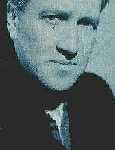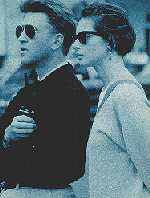| David Lynch Interviews & Articles |
| Kafka gives me a good mood |
 Christian Kämmerling interviewed David Lynch for the German newspaper "Süddeutsche Zeitung (supplement)" in 1990. They published the interview on September 21. This translation certainly differs slightly from the original wording, but I hope to be as true as possible to the original text.
Christian Kämmerling interviewed David Lynch for the German newspaper "Süddeutsche Zeitung (supplement)" in 1990. They published the interview on September 21. This translation certainly differs slightly from the original wording, but I hope to be as true as possible to the original text.
Would you try to describe your ideal of beauty, please. I'm not sure if there's an ideal behind the things I find beautiful. I find quite different things beautiful: the look of broken glass, for example; or an oil puddle on the ground. Skin – is there anything more beautiful? Only smoke in the sky is almost that beautiful. Or wire. Teeth, too. Is there a magical connection between teeth and oil on the ground?
There's dozing a psychological connection in it. Let's take the teeth: they are very hard and stick in the mouth which is very soft and vulnerable. I'm always fascinated by contrasts. Oil and concrete. Or a factory by the sea. The sea itself – without the factory – isn't beautiful in my eyes. Only the transformation by man makes nature beautiful. An oil plant in the desert. A factory in the landscape.
You obviously make an exception with women. In this case your taste corresponds to the classical ideal of beauty: your wife is Isabella Rossellini. In each one of us lies the capability to find contradicting things equally beautiful. I'm there no exception. That's pretty normal. In your movies you're holding the magnifier merciless over the alleged normality. If one looks closer, the idyll turns to horror and the nice neighbor changes into a monster. "Blue Velvet" starts with a harmless stroller in the woods who suddenly finds a severed ear. There just happen strange things in the woods. I grew up in Montana. There you here the strangest stories. But people tell you only ten percent of what they do know. You have to discover the rest yourself in the brushwood. Were you as early as a boy fascinated by this concealed seamy side of normal people, by this mystery in the brushwood? I really enjoyed it. That's how I got filled up with ideas, moods and fantastic images. Though I guess the way you grow up doesn't really matter. Every surrounding is thrilling if you only look close enough. Do you get your inspiration from dreams too? No, not if you mean the dreams in your sleep. I like to hang onto day-dreams. But there must be a perfect environment, like, I have to sit in a well-lit room which is really clean. For example a Coffee Shop. There I let my mind travel. There I dare to enter fantastic worlds in my mind – and should I suddenly feel uneasy, I can right away go back to my Coffee Shop. There's such a little paper napkin holder on the table. On those napkins I make notes of my ideas. That's pretty convenient. If I have enough napkins together I'll make a movie. Is it true that you go to the same restaurant for years and eat always the same thing? Yes, for seven years always at 2:30 p.m. "Bob's Big Boy" is the name of that diner, a pretty normal restaurant in L.A. It's a great advantage if always eat the same thing: you don't have to waste a thought on what to order. However, I noticed on myself that after a while your ability of enjoyment burns out in a way. Then you've got a problem. A big problem? Well, you have to look for a new taste you're fascinated with. I've just been through this stage. Did you find anything? Yes. I just changed to Swiss cheese. Mel Brooks was really right. He once called you "Jimmy Stewart from Mars." Newsweek recently compared you with Dali. Would you classify yourself as a surrealist? The most surreal experience I've ever had was Philadelphia. I lived there for five years. A real absurd world. Otherwise the influence of the surrealists was rather small. Are there any books you can't get out of your mind. I only pick books that give me a good mood. Kafka, for example. It's strange what lights you up. I'm just trying to have as much fun as possible in my life. I'm a "funaholic". In your latest film "Wild at Heart", your fun with brutality reached the pain threshold. I don't depict violence in a realistic way, I push it a little – not too far, just a little bit – into poetry. I want the audience to be touched by the power that is spawned by the struggle between life and death. There's been a rumor that you would sometimes even in private pull a severed ear out of your pocket to frighten people. Now and then. Actually people thought it would be the ear from "Blue Velvet." But it wasn't the same ear. It was just an ear someone once sent me by mail. A rubber ear. I happened to have it in the pocket. I don't know why. I have a lotta strange things in the pocket. Has filmmaker always been your dream job? No. I grew up inside some kind of egg. Nothing really moved me until I was nineteen. I came to Philadelphia at the age of nineteen. There I woke up. I had my first original thought in Philadelphia. What sort of brain-wave was that? I always wanted to be a painter – even as a child. But where I grew up, in Montana, there were only flat painters. People who painted their houses new. Then we moved, as I said, to the east coast and a new friend of mine told me his father would be a painter. Art painter. That was an overwhelming experience: I always thought you'd have to stop painting when you're adult. Right from this moment I wanted to become a painter. I painted all night long – and one day I had this idea: that what I'm painting would express something of me. I suddenly felt there is something inside me, something very personal. This desire of painting didn't leave me to this day. If I have some time I still throw myself like mad into painting. Or into music. I'm very occupied with music, that's right. I wrote a symphony with composer Angelo Badalamenti - the "Industrial Symphony No. 1" Actually, for me, music is the ideal method of creating a mood. But for me music is also when I go into factories and see and hear those enormous machines - that's orchestratd construction. I love factory buildings most of all steel mills. I'm fascinated by machinery. But above all I love cars. The idea of putting metal parts in a specific way into one another and suddenly this thing is moving and you can drive with it - magic. Do you still own your beautiful old Packard? No, I sold it. To own such a car includes a lot of worries: There's perpetually something out of order, the repairs devour money - frustrating. But no doubt, such a car gives you fantastic experiences. The way you change depending on in which car you're sitting is very interesting. The mood changes, all your self-esteem. The scenery in your movies, the deceptive idyll, often seems to me like an American Bavaria. Have you ever been in Bavaria? Yes. I've had a Bavarian uncle. He was a painter and lived near Munich. Jürgen Prochnow once invited me into his house in Bavaria. Strange to say but the mood in Jüurgens house reminded me of something. The structure of the wall plaster, the light in the rooms, the stillness - unbelievable, it took me straight back into the world of my youth. Have you ever visited a psychiatrist? Yes I did, for one hour. Diagnosis: "Hopeless case"? It didn't even come to a diagnosis. I was afraid right from the beginning that in the course of the therapy my creativity could get lost, too. I told the psychiatrist about it and he was a very honest man who told me: Yes that could happen. After that I said goodbye. |
Interviews | David Lynch main page
© Mike Hartmann
mhartman@mail.uni-freiburg.de
